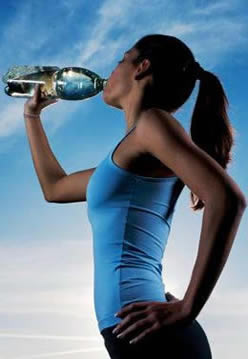WHY TO AVOID DEHYDRATION!!! |
||
Even minor dehydration can lead to poor performance and reduced coordination, as well as painful muscle cramps and early fatigue. In severe cases, it can lead to heat-related illness, and even death. Drinking plenty of liquid helps reduce the risk of overheating, and it’s the best way to ward off dehydration. With dozens of beverages to choose from, deciding which one is right for you can be a challenge. Adequate fluid intake is vital to maintaining proper function of the heart and other working muscles, as well as regulating body temperature. When you don’t replace the fluids lost in sweat, you run the risk of becoming dehydrated. For most folks engaging in short periods of moderate-intensity activity in warm weather, water will do just fine. Because it requires very little in the way of digestion, water is easily absorbed by the gastrointestinal tract and quickly delivered to the bloodstream. An ice-cold soda may taste great on a hot day, but it’s not the best fluid-replacement beverage on the market. The carbonation in sodas tends to fill your stomach with air, making you feel full long before you’ve satisfied your body’s fluid requirements. The high sugar content of regular soft drinks can also pose a few problems. If you’re exercising to lose weight, you probably don’t need the extra 160 calories found in most 12-ounce cans of soda.The sugar in soft drinks also requires digestion in the stomach before the body can use it. As a result, the liquid doesn’t reach the bloodstream as quickly as water. While the caffeine in sodas may energize you and improve your performance to some degree, it also has a mild diuretic effect. Caffeine-containing beverages tend to promote fluid loss from the body rather than fluid retention. Fruit juices are packed with vitamins and minerals, and in terms of nutrition, they’re far superior to soft drinks. As a fluid-replacement beverage, on the other hand, they’re not much better. Fruit juices have relatively high concentrations of the sugar fructose. Because fructose has a rather slow absorption rate, drinking undiluted fruit juices during exercise can lead to gastrointestinal distress, including abdominal cramping and diarrhea. Sports drinks are an excellent choice for satisfying your body’s fluid requirements, especially if you’re working or playing vigorously for more than an hour. Sports drinks contain important electrolytes, including the minerals sodium, chloride, potassium, and magnesium, which are lost through perspiration.In addition to electrolytes, most popular sports drinks contain small amounts of carbohydrates. Not only do these carbohydrates fuel working muscles and help enhance endurance, they also give sport drinks a slightly sweet taste. When it comes to fluid replacement, taste matters. Most experts agree that thirst is not always an accurate measure of the body’s fluid needs during periods of physical activity. Folks who aren’t crazy about the taste of water may not drink enough of it during exercise to prevent dehydration. Several studies have demonstrated that when offered a choice, most exercisers drink substantially more of a flavored sports drink than water. To further encourage adequate fluid intake, the American College of Sports Medicine (ACSM) suggests that in warm weather, beverages should be kept cooler than the ambient temperature: typically between 59 and 72 degrees Fahrenheit. Liquids should be kept close at hand during activity, and should be served in sports bottles or other containers that allow for easy access on the go. The ACSM recommends drinking early and often during activity. Consuming 17 ounces of liquid two hours before you begin exercising not only gives you a head start on your fluid intake, it also gives your body a chance to eliminate any excess fluid consumed. It’s a good idea to drink every 15 minutes or so during activity, since it helps replace body fluids lost through perspiration. Staying well hydrated during exercise not only protects your health, it also improves your ability to concentrate and perform your best. Sipping fluids immediately following activity helps your body cool down and allows your muscles to recover more quickly. Playing and exercising outdoors is a great way to have fun and get in shape. Making sure that you’ve got plenty of the right kind of liquid refreshment on hand will make your summertime activities a little safer, and a lot more enjoyable. Source: This article is published to educate and aware the community about Dehydratation risk during the hot summer days and it was based from the article “Heat-related illnesses:learn the symptoms and warning signs” orinal written by Rallie McAllister, M.D., M.P.H., is a family physician in Kingsport, Tenn., and author of “Healthy Lunchbox: The Working Mom’s Guide to Keeping You and Your Kids Trim.” Her Web site is http://www.rallieonhealth.com. |
||
Salud + Health Info is for information and educational purposes only. You should not rely on this information as a substitute for personal medical attention, diagnosis or hands-on treatment. If you are concerned abut your health or that of a child, please consult your family’s physician or health provider immediately and do not try to diagnose yourself. Copyright © 2001-2009 Info Option Network |
Bienvenido a la primer revista dedicada al cuidado de la salud
 info
info
The first, the best & the only English & Spanish Magazine in San Diego, California
Enjoy Fireworks Safely. As the July 4th holiday approaches, the Home Safety Council urges families to enjoy fireworks the safer way, by attending locally sanctioned fireworks shows presented more
|
Better be Safe than Sorry With the Sun Sun safety should actually be practiced year-round, but we are more likely to more |
Dehydration? All summer, people are spending more time working and playing outdoors. When you’re exercising in hot, humid conditions, drinking enough of the right kinds of liquid is especially important.When the temperatures rise, it is essential to exercise with adequate fluid..... More
|
|
